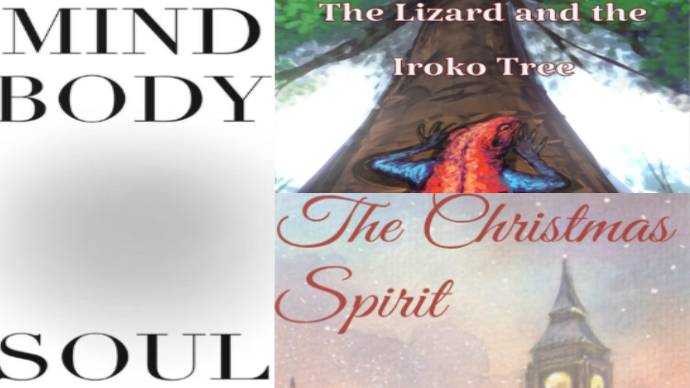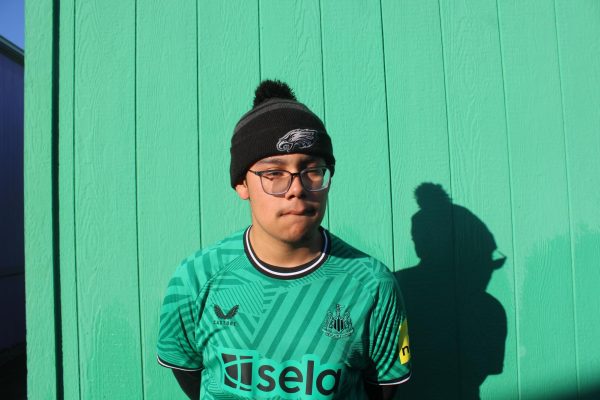The Write-A-Book challenge is a yearly competition where students throughout PGCPS get a chance to display their writing skills. In all grade levels, many students write books they are passionate about. Starting in August, the authors then take time to revise their work. Two of the three stories that had won were both short stories and the other was poetry. A ceremony for the writers will be held May 16th after school to congratulate all winners of the competition. The Raider Review interviewed each of the three winners to talk further about their work.
Mind Body Soul, Onyebuchi Nwaka
Finishing in first for 9th grade poetry, Mind Body Soul contains 15 short poems surrounding the characteristics of humans. It splits into 3 sections which are already listed in the title of the story. The piece was really relaxing and focused on mental wellness. It takes a “deeper dive into the interconnected aspects of a human being, specifically for Women” Nwaka stated. “I want my readers to take away the importance of cherishing each part of their being.” By conveying emotions of yearning and resilience. Out of the 15 poems 3 stand out, each named after the title of the work. Soul describes the light, and feeling of our souls, the life, the color. Importantly it goes into “A certain womens soul” which was described as vacant, waiting for a light to spark. Body strongly resembles our progress in life, changing as we do. Our actions are similar in our body, when we look back to our past we see how our actions reflect on our appearance, physical, emotional, and mental. Mind, a personal favorite for author Nwaka. Focuses on the observation of our surroundings and our reaction to things we sense. To see more of the poetry, read Mind Body Soul
Christmas Spirit, Juliet Ibironke
Third place for 9th grade short story, Christmas Spirit surrounds the relationship between 2 characters, Binuti and Gabriel. Gabriel orchestrates a choir of kids at a catholic church in NYC, he builds a strong character by showing compassion and care for the children in his choir. “The short story is supposed to give readers something to look forward to, which in this case is a proposal from Gabriel to Binuti.” Juliet added, “The way they both have good experience with children makes the reader apprised to the potential future of the two, maybe having a child of their own in their own marriage which is soon to come.” The story is set in the winter, but it has warmth. A big reason for this is “The descriptions in the story that I think help the story move along are small hints in the dialogue that talk or reference previous conversations or events in the story.” Through the descriptions in the story, you can already tell things that happened in the past. Juliet mentions the line “Nice trench coat, see you took my advice.” Descriptions like this help the reader’s understanding of the characters’ relationships. To see more on the romantic short story, read The Christmas Spirit.
The Lizard and the Iroko Tree, Eric Nwuha
Finishing first for 11th grade short story, an experimental take on a proverb. The author has deep Igbo roots, proverbs are commonly used to simply portray complex ideas like self resilience and pride. Similar to Western Fairy tales or fables, like the Tortoise and The Hare. The story ends up memorable, has a message, and spurs someone to work, all to give them hope and remind them that their efforts won’t go unnoticed or unrewarded. The book goes into detail about the lizard climbing the tree. It takes on very hard challenges and it takes its hope and confidence to climb. Eric wants the readers to know “Even if you’re doing something nothing’s done before, or nobody is there to cheer you on as you do it, behind the scenes someone is rooting for you and wants you to succeed.” Eric used descriptions to help visualize the book, allowing the reader to understand both the environmental context, and the feelings of the lizard. Implementing metaphors and similes to get the readers to imagine how something non-human, like a lizard, might feel. An example of this was the mention of the lizard’s sweating. Lizards do not actually sweat. However, Eric mentioned it so that the reader has a way to “imagine themselves climbing that same tree.” Using simple imagery and obvious characteristics of the tropical setting, Trying to introduce readers to the environment where the lizard proverb was developed. Eric reflected “Igbo culture is highlighted by proverbs and adages, many revolving around animals native to Southeast and southern Nigeria.” To go deeper into Eric’s background, read The Lizard and the Iroko Tree



